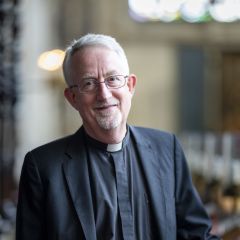Theology, Religion, and Philosophy of Religion
This fascinating course enables you to combine the study of world religions with philosophy, ethics, history, literature, languages, sociology and classics. It explores contemporary and historic thought, culture, and texts.

Course overview
The Cambridge Theology, Religion, and Philosophy of Religion (TRPR) course is exceptionally open in the options it makes available to undergraduates. It enables you to either mix up subjects as you go or to carve out a specialist area of interest over the three years. Some students choose to focus on Ethics and Philosophy of Religion, others on World Religions, and some home in on Christian Theology or Biblical Studies.
The first year (Part I) is designed to introduce you to the basic concepts and skills needed for the study of TRPR. There are two compulsory elements which are (a) the study of a scriptural language (Hebrew, New Testament Greek, Qur’anic Arabic or Sanskrit), and (b) the study of Hebrew Scriptures (Old Testament) or the New Testament. The other three papers in Part I can be chosen from the five options available, covering the other subject areas studied in the Faculty (Doctrine, Philosophy of Religion, Church History, World Religions, and the Study of Religion).
In the second year (Part IIA), you study four papers out of a choice of sixteen. The wide variety of subjects available allows you to develop a course suited to your own interests within the discipline. The final year (Part IIB) also involves studying four papers from a wide range of options, including specialist and interdisciplinary papers. You can also choose to write a dissertation in the final year instead of one paper.
Theology, Religion and Philosophy of Religion at Cambridge allows you to delve deeply into different religious traditions, to explore the connections between them, and to understand their relationship with the larger societies of which they are a part. The flexibility of the degree structure allows you to choose the particular subjects and themes that you want to pursue. Some students choose to follow a pathway that matches their interests for one or more years. Pathways are informal programmes of study; you do not have to officially declare your choice, and you are not bound to follow it every year. Possible pathways include Islamic Studies, Jewish Studies, Religious Traditions of India, Biblical Studies, Christian Theology, Christian History, and Philosophy of Religion.
For more information about the course and its modules, visit the University website.
What is it like to study TRPR at King’s?
King’s usually has one or two TRPR students each year. The hallmark of Cambridge teaching is the supervision - a weekly one-to-one or one-to-two meeting with an expert in your field. You will usually have one or two hour-long supervisions per week during term (usually based on essays you have submitted in advance). Teaching in this way is personalised, highly rigorous, and allows you to hone your ideas and your academic skills in a hands-on, open and conversational environment. Alongside supervisions, you will have weekly lectures and/or seminars in your chosen courses. In the first year, you will have classes three times a week in your chosen language, and will need to do daily practice.
What do we look for in an applicant to TRPR?
Strong applicants will demonstrate an enthusiasm for the subject and a curiosity about religious ideas and their impact on individuals and society. They need to be able to think critically and show an aptitude for independent thinking, as well as a willingness to explore ideas with others.
Requirements
A Level: A*AA
IB: 41-42 points overall with 7, 7, 6 at Higher Level
Subject requirements: While none are required, many applicants to this course study one or more of Religious Studies, English (language or literature), History, and/or a language
Admissions assessment: None
Written work: 2 pieces
Written work
If you are taking a qualification relevant to TRPR, consider submitting work from that. Otherwise, submit any essay that you feel represents your abilities well, and which you find interesting. Be prepared to discuss themes relating to your written submission at interview.
Careers and graduate Opportunities
The Cambridge TRPR course is wide-ranging, allowing you to develop a range of transferable skills, ranging from the linguistic and historical to the conceptual and analytical. Recent King’s graduates in the subject have gone into business, law, journalism, the Civil Service, music, charity administration, publishing, and teaching in both schools and universities.
What is the best thing about studying TRPR at King's?
While the College subject community is small, it is an incredibly supportive and academically enriching environment.
A top tip for applicants to Theology, Religion, and Philosophy of Religion at King’s
Be open to conversation and let your interest shine through.
People
The Director of Studies for 2025-2026 is Rev. Dr Hueston Finlay.

